The work of the European Parliament
| Sito: | Moodle OBC - Transeuropa |
| Corso: | The Parliament of Rights |
| Libro: | The work of the European Parliament |
| Stampato da: | Utente ospite |
| Data: | giovedì, 22 gennaio 2026, 18:58 |
1. European Parliament: organisation and competences
Parliament is currently the only European institution the members of which are elected by direct universal suffrage every 5 years. It is made up of 705 deputies from the 27 member countries in a number proportional to their population.
This is the current composition of the European Parliament:
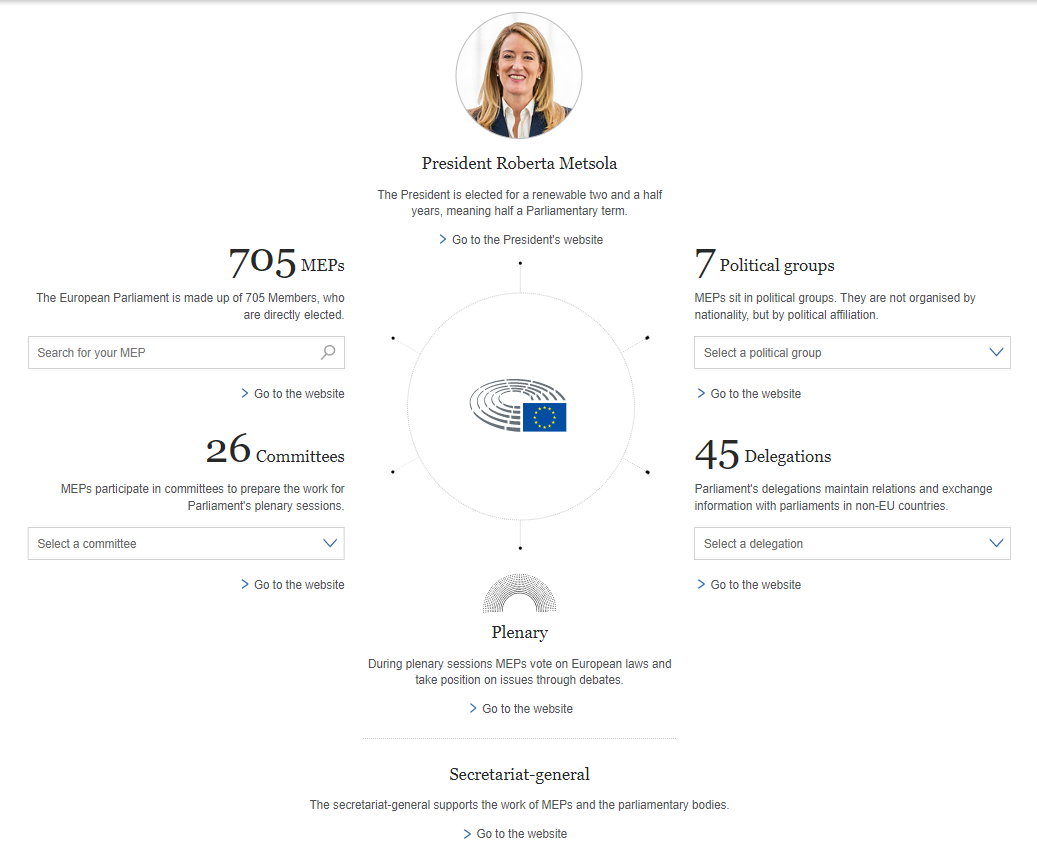
Source: European Parliament
This infographic summarises the powers currently attributed to the EP, mostly on the basis of the Lisbon Treaty
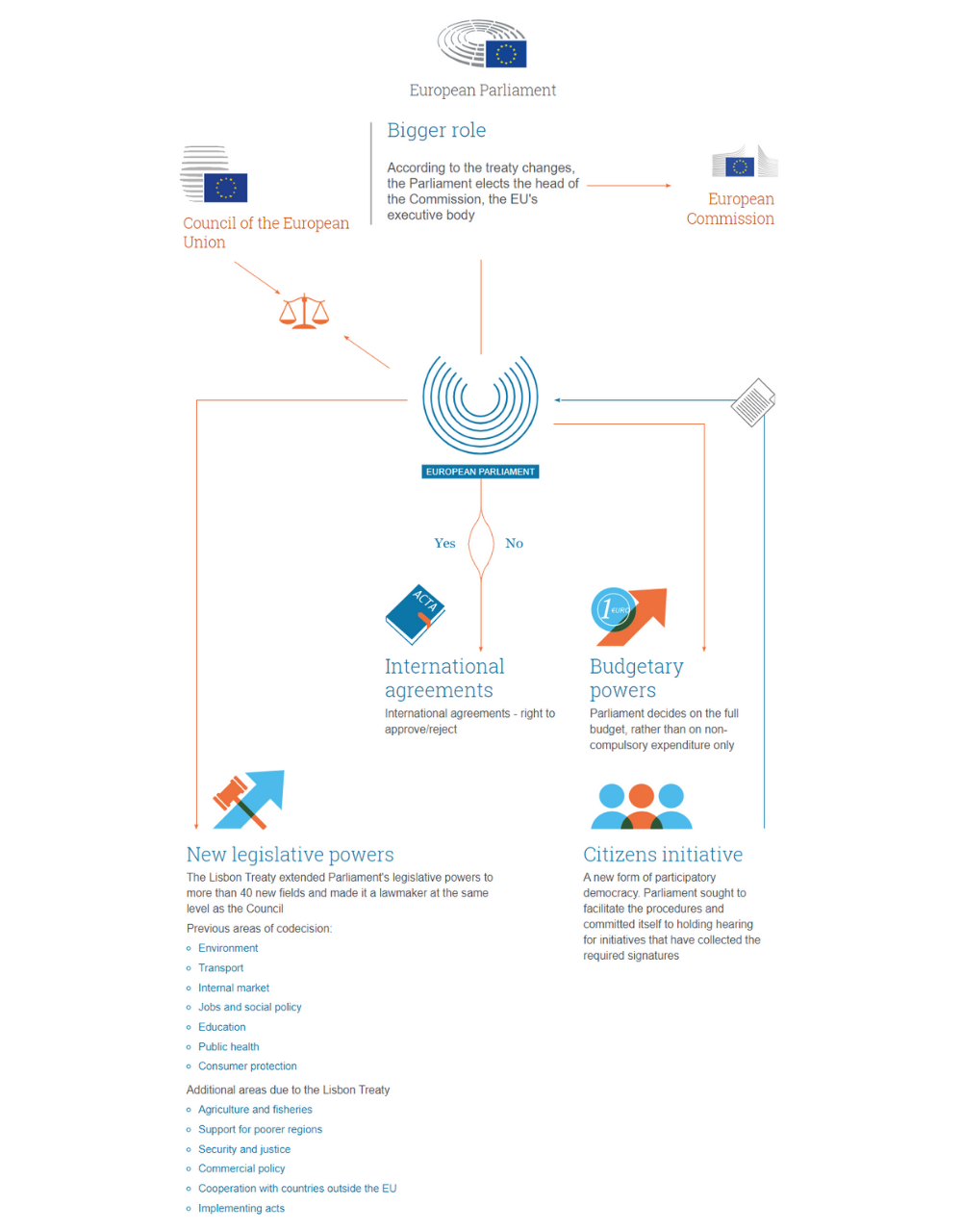
2. EP political groups
MEPs are elected on the basis of national electoral systems, respecting some common principles enshrined in European law, in particular proportional representation.
Once elected, they are not grouped on a national basis but by political affiliation. The current EP is divided into 7 political groups that sit together in the parliamentary hemicycle.
Watch the video introducing the current political groups:
See also the interactive map of the hemicycle of in Strasbourg and Brussels.
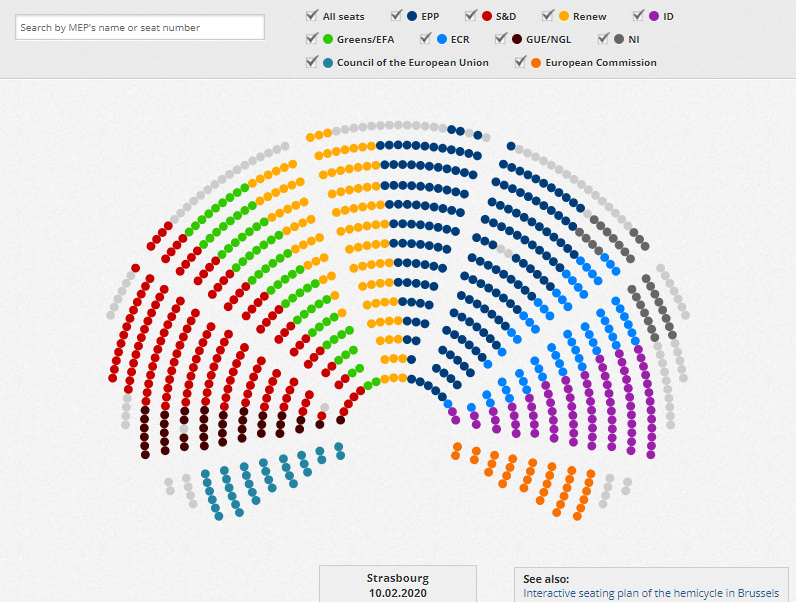
According to parliamentary regulations, a political group can be formed at any time during the term of office; 25 MEPs from 7 different countries are needed to form a group.
Currently, the political groups present in the EP are:
Group of the European People's Party (Christian Democrats) (EPP)
Group of the Progressive Alliance of Socialists and Democrats in the European Parliament (S&D)
Renew Europe Group (RENEW)
Group of the Greens/ European Free Alliance (GREENS/ EFA)
Identity and Democracy Group (ID)
European Conservatives and Reformists Group (ECR),
The Left Group in the European Parliament (GUE/ NGL)
MEPs who do not belong to any political party are known as 'non-attached members'.
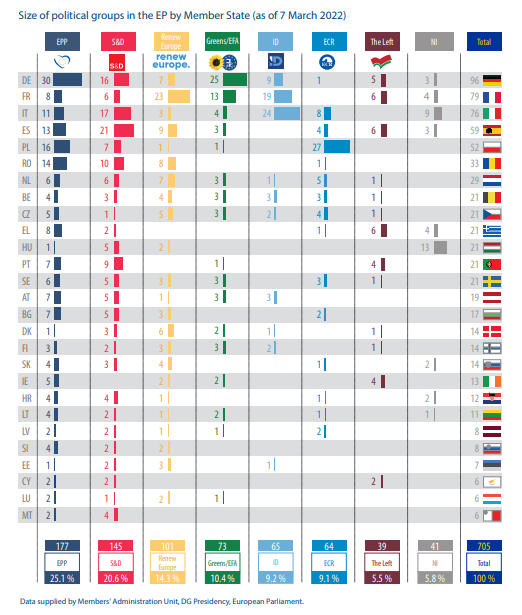
Source: European Parliament, 2022
To find out more, read the briefing from the European Parliament Research Service: https://www.europarl.europa.eu/RegData/etudes/BRIE/2022/698880/EPRS_BRI(2022)698880_EN.pdf
The European political groups are multinational and multilingual but also multicultural if we consider the variety of political experiences among MEPs. Making a synthesis of such diversity is not easy but, if you look at the voting choices of the MEPs, you can see how belonging to a political group is the most relevant and by far more determining a factor than national membership.
Furthermore, in European dynamics it is not only national and political affiliation that counts, but also institutional (e.g. Parliament vs. Council). It is not uncommon for Parliament to express support for specific causes through joint declarations by various cross-cutting political groups from both a national and ideological point of view.
3. Headquarters and agenda
The European Parliament has three headquarters. Most of the plenary sessions take place in the French headquarters in Strasbourg, while the parliamentary committees meet in the Brussels headquarters. The city of Luxembourg hosts the General Secretariat of the EP where mainly administrative issues are resolved.
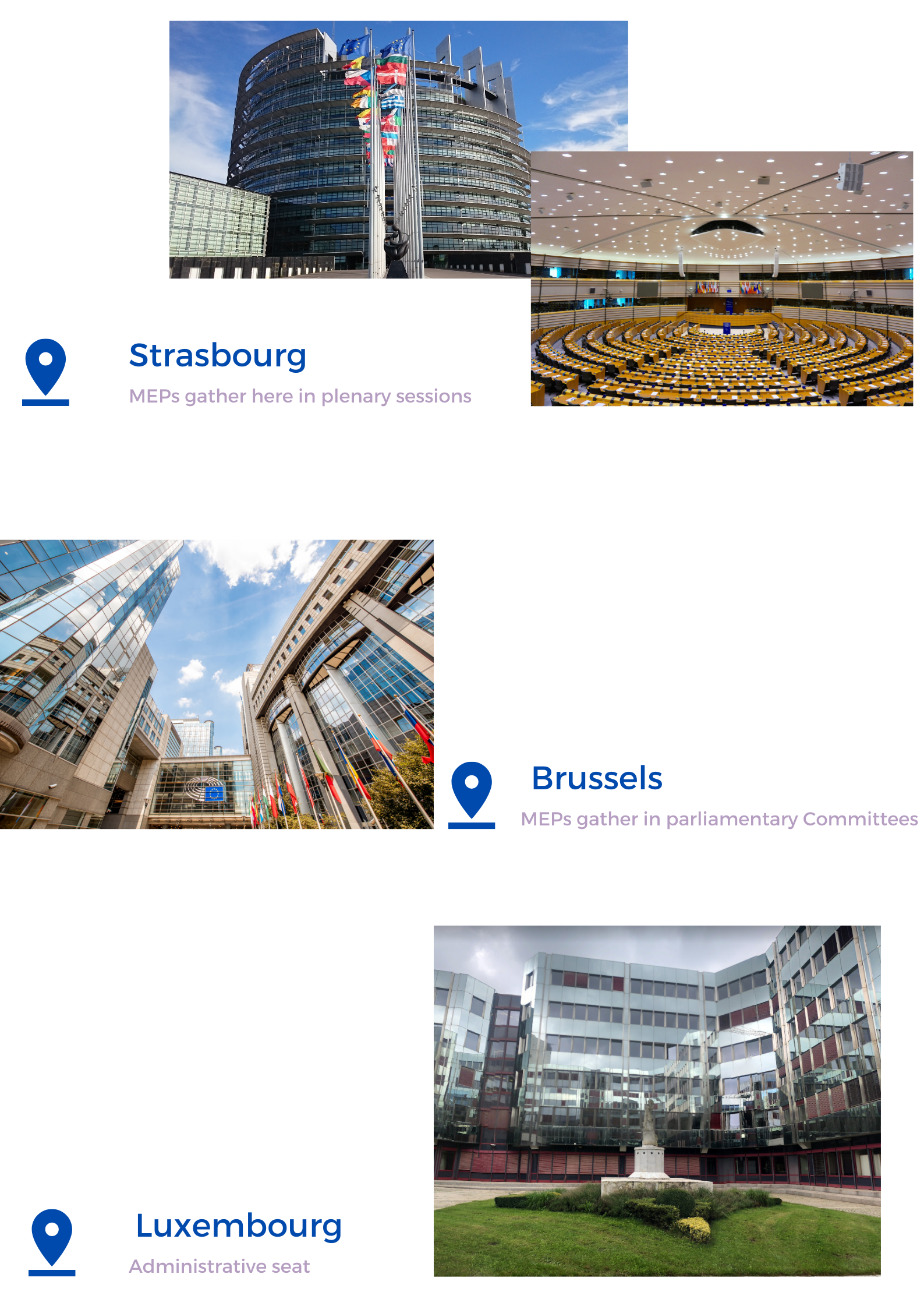
What do MEPs (Members of the European Parliament) do?
→ they work and vote on European laws covering almost all areas of EU competence;
→ they work on the EU budget;
→ they carry out democratic control over other EU institutions and agencies, for example they elect the President of the European Parliament and approve the President of the European Commission.
These two roles are currently held by Roberta Metsola and Ursula von der Leyen respectively.
To facilitate understanding of Parliament's activities and schedule, the parliamentary calendar has been organised according to a colour code: red for the plenary week; pink for the week of commissions; blue for the week of political groups; turquoise when MEPs go to their constituencies.
Plenaries take place once a month and are generally concentrated in a few days of the week during which the deputies discuss or vote on a maximum number of files. The most time-consuming work, however, is the preparation which happens during the pink and blue weeks in Brussels (source: How it works: the European Parliament).
Watch this short video and find out how MEPs represent European citizens:
4. The parliamentary committees
Most of the work of the European Parliament is carried out by parliamentary https://www.europarl.europa.eu/committees/en/home, which are divided into standing and temporary.
The standing committees meet once or twice a month in Brussels, in sessions open to the public, and prepare legislative proposals to be voted on in plenary. Temporary and special committees are set up to address particular problems.
Here is the list of the EP committees: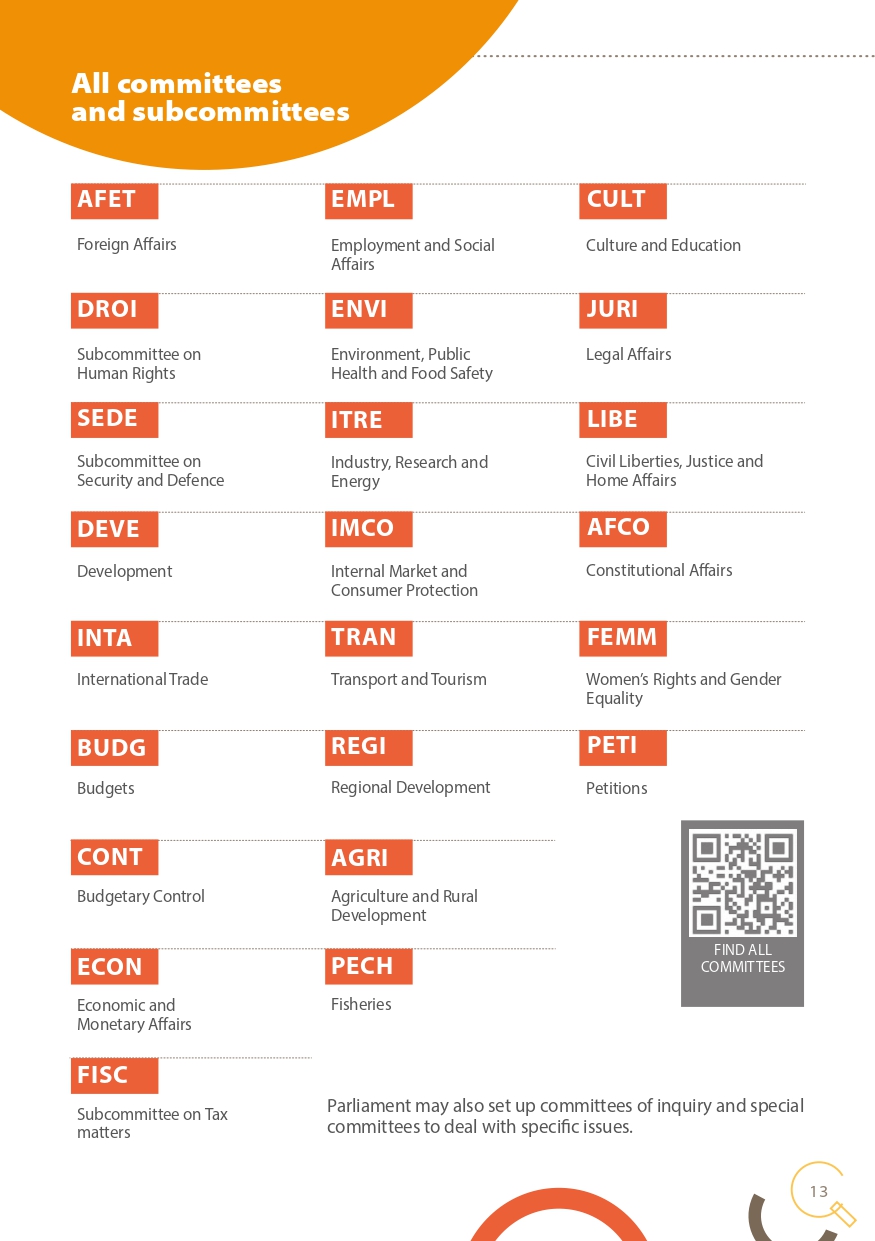
Source: European Parliament 2021
Committees vary in number of members and in importance, but the composition always reflects the weight of the political groups in parliament.
The committee responsible for anti-discrimination issues is one of the most important: LIBE- Civil liberties, justice and home affairs.
Rapporteur: This is the MEP who is instructed by their committee to prepare a report on the legislative proposal in question. Their task is to draft a text to be voted on within the commission and subsequently in the plenary session. While drafting a report, the rapporteur discusses with other MEPs and consults with experts at specially organised hearings.
Shadow rapporteur: To follow the progress of a report, political groups can appoint shadow rapporteurs responsible for the topic in their political group. They are therefore of vital importance in finding a compromise between several political groups.
Coordinator: Political groups appoint a representative in each committee as coordinator and spokesperson for the group. The coordinators mobilise the members of their respective group during the voting and appoint the rapporteurs and shadow rapporteurs.
Rapporteur for opinion: If a committee is asked for an opinion on a report prepared by another committee, a draftsman is appointed.
Parliamentary work in committees where amendments to legislative proposals are discussed and approved is illustrated in this video:
5. Parliament and the "Horizontal Directive"
Although European protection from discrimination enjoys a broad legal basis in the Treaties and in the Charter of Fundamental Rights equivalent to the Treaties as well as in the approved directives, the issue of the so-called horizontal Directive 2008/0140(APP) has not yet been resolved.
Since the LIBE Parliamentary Committee presented the report to the plenary assembly in March 2019, the discussion has not come to an agreement.
The lively debate in plenary that immediately followed highlighted the differences between MEPs and political groups. Some expressed support for the directive, highlighting the need for higher standards of protection against discrimination, while others expressed concern about the increase in costs for public administrations, while others claimed alleged risks for religious freedom.
Eventually, however, the European Parliament expressed its generally positive opinion on the directive in a resolution adopted on 2 April 2009.
The horizontal directive was instead blocked by the Council which since then has seen opposition from seven member countries, including Germany. While recognising the importance of the fight against discrimination of all kinds, some states have questioned the need for the proposal, arguing that the directive violates the national competences of member countries and does not respect the principles of subsidiarity and proportionality.
In 2012 a hearing was held at the LIBE Committee in which some important NGOs were invited to suggest how to solve the problem of the horizontal directive blocked in the Council.
In her speech at the 2014 plenary, ALDE MEP Sophie in't Veld harshly criticises the political stalemate that prevents the approval of the directive she had been shadow rapporteur for.
In October 2019, the EP held a debate on how to "take forward the horizontal directive against discrimination", during which several MEPs stressed the need for such a directive to fill the persistent gaps in protection against discrimination in the EU.
Finally, the EP called for the adoption of the directive for the umpteenth time in the resolution of January 2021 on the new EU Strategy for gender equality, which stresses that "an intersectional horizontal perspective is essential in any policy on gender equality in order to recognise and address the multiple threats of discrimination" and in the resolution on Equal Treatment in Employment and Working Conditions in the light of the UNCRPD (2020/2086(INI)) which "calls on the Council to unblock, without further delay, the negotiations on the proposed horizontal anti-discrimination directive and to proceed towards an agreement, thus extending the protection of persons with disabilities outside the sphere of work”.
Sources:
The EU's role in combating discrimination
Legislative Train Schedule - Area of Justice and Fundamental Rights
6. The role of intergroups
Intergroups are transversal organisations that bring together MEPs from different political groups and committees for informal exchanges of views on particular issues and to promote contacts between MEPs and civil society. They are not organs of the EP and, formally, they cannot take a position or vote but they can bring particular issues to the attention of key figures in the EU. By organising meetings between MEPs from different groups, intergroups are able to put the spotlight on specific issues. By inviting certain speakers, they signal particular points of view. They can also invite Commissioners for an exchange of views.
The very existence of an intergroup on an issue indicates that the EP finds it important. The strength of an intergroup depends on how active it is and the level of involvement of MEPs.
The work of the intergroups is divided into parliamentary and non-parliamentary.
Parliamentary work includes drafting briefings, parliamentary questions, resolutions, declarations, reports, parliamentary hearings and advising ahead of major votes.
Non-parliamentary work includes organising and participating in events (inside and outside the EP), writing articles, letters and press releases, newsletters and managing the online presence.
The work of intergroups, especially those dealing with racism and discrimination, is particularly relevant for the purposes of this course: Disability Intergroup, Anti-discrimination and diversity intergroup (ARDI),Intergroup on freedom of religion and belief (FORB), Intergroup on LGBTI Rights.
We will pay particular attention to the Anti-Discrimination and Diversity Intergroup (ARDI), which aims to counter racism and inform about the action of the EP against discrimination.
ARDI has 7 informal working groups, made up of members interested in specific topics such as Islamophobia, Afrophobia, Xenophobia, and racism against nomads.
Here Alfiaz Vaiya*, coordinator of ARDI from 2015 to 2019, explains the work of the intergroup in more detail.Alfiaz also explains how intergroups influence the EU legislative process on anti-discrimination.
In 2016, ARDI obtained the waiver of parliamentary immunity for two MEPs responsible for hate speech. Here Alfiaz talks about this episode and the work of the intergroup against hate speech in Europe.
*Alfiaz Vaiya was the coordinator of ARDI from September 2015 to 2019. Before joining ARDI, Alfiaz worked on anti-discrimination issues for civil society organisations in London and Brussels and in the European Parliament. Alfiaz has a law degree from Leeds Metropolitan University and a master's degree in International Relations: Global Economic Governance from the University of Birmingham.
Sources: